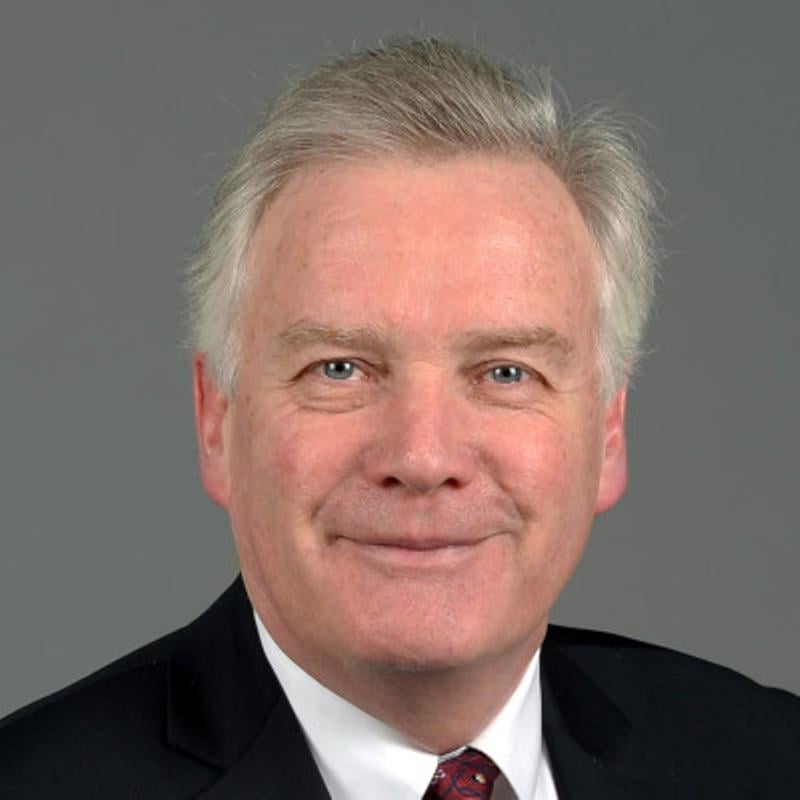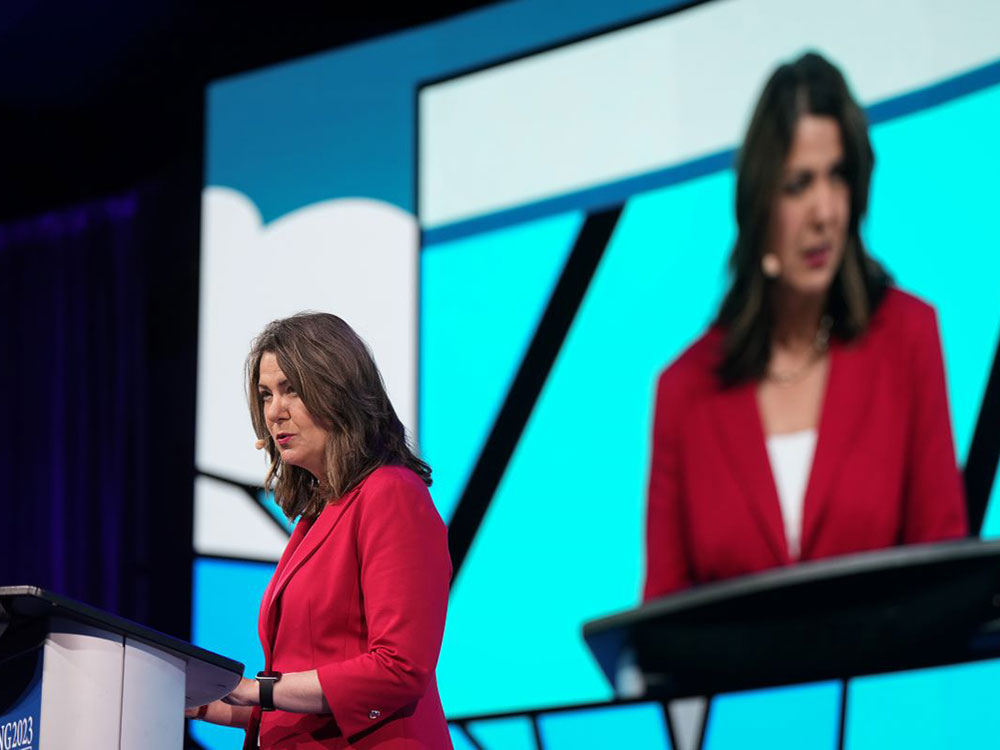She loves it, she loves it not.
Premier Danielle Smith’s support for carbon capture projects is fickle and complicated, much like her understanding of the realities of climate change.
It all depends on the situation she finds herself in at the moment.
This week she waxed poetic about the potential for carbon capture, utilization and storage projects, to reduce emissions and save us from climate change while allowing us to keep using fossil fuels.
“Let me tell you, we are only going to strengthen the case for carbon capture, utilization and storage in the years ahead. In fact, Alberta is set to remain a leader in energy production and CCUS for decades.”
That was Smith giving the keynote address to a luncheon audience of 700 people at a major convention on carbon capture in Edmonton on Tuesday. She was, in other words, speaking to the converted.
However, two weeks ago while on a radio talk show, Smith expressed doubts: “I wish that carbon capture was as perfect as they think it is.”
By “they,” Smith meant the federal government. In that context, Smith was using the experimental nature of carbon capture projects as a way to attack the federal government’s clean electricity plan that, among other things, would use carbon capture as a requirement for new natural gas burning power plants.
Smith, a loud proponent of the fossil fuel industry, does not want Ottawa placing restrictions on how Alberta produces electricity.
The bottom line is that Smith would dearly love for CCUS projects to be able to live up to the hype where they capture millions of tonnes of carbon dioxide a year from industrial smokestacks, compress it into a fluid and pump it deep underground — with some CO2 being used to make products such as plastics.
And Smith needs carbon capture technology to work at a large scale if Alberta is to become home to her dream for a multibillion-dollar blue-hydrogen industry. Simply put, the process involves turning natural gas into clean-burning hydrogen but creates massive amounts of CO2 that has to be dealt with.
But getting projects to work at scale has proven difficult. They are complex, expensive, rely on government help, and haven’t lived up to the promise created over the past 20 years by politicians who are desperate for a technological solution to climate change.
And then there’s public skepticism if not outright opposition to having millions of tonnes of compressed CO2 being pumped into rock formations beneath communities.
In Alberta, a consortium of large oilsands producers called the Pathways Alliance wants to build a 400-kilometre pipeline to transport carbon dioxide from 20 oilsands plants to be sequestered in an underground facility near Cold Lake.
The proposal worries Cold Lake First Nation Chief Kelsey Jacko, who attended Edmonton's CCUS convention and told CBC News his community has been victimized by resource projects in the past that have created tailings pond issues. He's afraid history will repeat itself: “It just seems like they're ramming it down our throat.”
Smith’s carbon capture flip-flopping
More carbon capture projects, though, are inevitable.
The International Energy Agency has said carbon capture is necessary to help reduce emissions but projects would need to bury 7.6 billion tonnes of emissions annually to make a dent. Currently, projects around the world account for just 40 million tonnes a year.
In Alberta, taxpayers have spent $1.24 billion on two projects that sequester about one million tonnes a year.
Alberta’s controversial history with carbon capture projects goes back more than a decade. So, too, Smith’s situational relationship with the technology.
In 2008, then-premier Ed Stelmach announced a climate change strategy heavily reliant on carbon capture where the technology would sequester 140 million tonnes a year by 2050. To kickstart what he hoped (futilely, it turned out) would be a CCS gold-rush, he promised $2 billion for half-a-dozen proof-of-concept projects.
In 2009, Danielle Smith became leader of the Wildrose Alliance and one of her first targets was Stelmach’s investment in CCS. She called the projects “wasteful,” a “boondoggle” and during the 2012 provincial election she promised to scrap the government’s plan.
Smith said her opposition was based on economics but at that time Smith was openly questioning the reality of human-made climate change: “We’ve been watching the debate in the scientific community and there is still a debate.”
Today, she is rewriting history. “We’ve been leaders on emissions reduction for more than two decades,” she declared in her Tuesday speech. “This is a field which is sometimes misjudged, disparaged and dismissed out of hand like so many emerging technologies. But critics are behind the times.”
It was a brazen assertion from someone who used to be one of those disparaging critics. But Smith is not the first politician to have a conveniently selective memory. And she is not the first Alberta premier to look at CCS as something of a magic bullet for a business-as-usual fossil fuel industry.
But she is the first to promote and doubt the technology at the same time. It all depends on the situation she finds herself in.
And these days she finds herself — or more correctly, has placed herself — in a never-ending war with the federal government. Ottawa has introduced an investment tax credit for carbon capture projects and while Smith says she wants to work with Ottawa to promote CCUS, she sprinkled her Tuesday speech with anti-Ottawa rhetoric: “Many of you are familiar with Ottawa’s overpriced and, we think, overhyped fantasy of a fully net-zero electricity grid by 2035.”
Gaslighting renewable energy firms
Speaking of brazen, at one point during her appearance, Smith declared, “There’s an investment climate here (in Alberta) that you can trust.” No doubt that was head scratching news to renewable energy companies blindsided by Smith’s abrupt seven-month moratorium on wind and solar energy projects — that according to the Calgary-based Pembina Institute is affecting 118 projects worth $33 billion.
Smith said she would be announcing Alberta’s incentives for CCUS projects by the end of November — before she heads to the United Nations Climate Change Conference in Dubai.
Yes, Smith is going to COP 28. Given that Canada is routinely presented with the "Fossil of the Year" award from environmental groups at these events and given that Alberta's oilsands industry is the reason, very few of Alberta’s Conservative politicians have dared enter the COP lion’s den.
But Smith is not one to shy away from a fight. In fact, her supporters want her in never-ending battles, whether they be with the federal Liberal government, Alberta’s NDP, or possibly now with delegates to COP 28.
Smith’s trip to Dubai is also part of her political tight-rope act where she is trying to appease her Conservative base by confronting climate “alarmists” while also insisting she is facing up to the reality of climate change.
She also wants to have it both ways on carbon capture, as ally and skeptic. That just adds to the confusing environmental signals coming from the Smith government.
When it comes to dealing with climate change, Smith wants to act on her own terms with her own timeline: “We don’t need what Ottawa has called the ‘just transition’ in Alberta because we do not intend to transition away from oil and gas. This is not about transitioning away from oil and gas, it’s about transitioning away from emissions.”
But to do that means getting carbon capture projects to work at a scale needed to make a dent in emissions.
They haven’t done that despite years of promises from politicians and billions of dollars from taxpayers. And nobody really knows if they ever will.
Smith is saying they will — unless you happen to catch her on a day she is saying they won’t. ![]()

















Tyee Commenting Guidelines
Comments that violate guidelines risk being deleted, and violations may result in a temporary or permanent user ban. Maintain the spirit of good conversation to stay in the discussion and be patient with moderators. Comments are reviewed regularly but not in real time.
Do:
Do not: